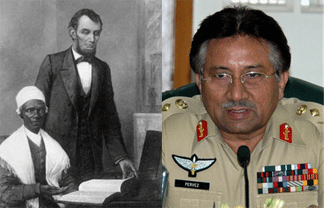
As November breaks, the news from the warmongering of terrorism has two new flares. In Pakistan, where some think Osama might still be cave sitting, General Pervez Musharraf has announced (or shall we say re-announced) martial law. On the border of Kurdish-controlled Iraq, some 100,000 Turkish troops are said to be poised for an attack on the PKK operating out of Iraqi territory. Meanwhile the fires have hardly been dampened in Iraq or Gaza and President Mubarrak of Egypt has been slated to run yet again. The more we wish things to change, the more they seem to stay the same. But there is a thread running throughout all these events: the role of America as a tarnished symbol of democracy and as unilateral neoconnected bull in a west-of-China shop.
Let’s start with Pakistan, a country packed with contradictions that have raged ever since the British Raj packed up its colonial baggage and fostered the partition of India. Democracy has not been absent here, but bullet casings trump ballet boxes and generals become presidents rather than the other way around. For example, General Musharraf, who seized power in October 1999, twenty years after an earlier general named Zia-ul-Haq pulled the same power play. In theory (meaning, in terms of the formal constitution that was just suspended by Musharraf), the leader should be elected and Musharraf’s self-imposed term was due to end this year. What is interesting about the latest suspension of constitutional law in Pakistan is not that it has been done again, but that it is being done “American” style. In his speech to the people of Pakistan and more pointedly to other world leaders, Musharraf claimed he had no choice but to declare martial law and cited Abraham Lincoln as his model. After all, as Musharraf recited, Lincoln had broken laws, violated the constitution, usurped arbitrary powers and trampled individual liberties in order to save the Union. Jefferson Davis could not have phrased it any clearer.
The Bush administration maintains that Musharraf is an ally in their war talk on terrorism, although his country is admitted to be one of the hotbeds of anti-American rhetoric. So perhaps it is alright (yet again) to overturn the principles of democracy in order to preserve order. If Lincoln did it, why can’t the President of Pakistan? But then Lincoln was facing a civil war with an opposing army, not a general dissatisfaction with corruption and the high-handed ways in which the government was run. Regional differences played a part, but the issue of slavery tipped the scales. Who, exactly, are the slaves that General Musharraf seeks to liberate? If Pakistan is already embroiled in a civil war, then we now have four going on at once: Iraq and Afghanistan, where American liberation has not brought about security and American lives are lost every day; Palestine, which at times explodes into Lebanon and Syria; and now Pakistan.
Appealing to Lincoln, the Great Emancipator in American hindsight, is a brilliant ploy for the embattled leader of Pakistan, but he would do well not to push the analogy too far. Lincoln, after all, was elected; Musharraf brushed aside the elected leader. And Lincoln paid a price, an assassin’s bullet. There were no suicide buggies outside the Ford theater in 1865, but there are plenty of suicidal militants on Pakistan’s uncivil roads. At one point, Musharraf stretches his quotation from Lincoln in an ironic way. Lincoln had noted that a life can be saved by amputating a limb (although not many did survive such cuts in the medical morass of the Civil War) but a limb cannot be saved by amputating a life. True enough, but this puts the general out on a limb. He is not likely to be cut off by those who hold democracy hostage to warring against terrorism, but his power grab may not be enough to block the winds of change in a country that has tasted democracy, with all its bitterness, and endured totalitarian rule, with its firm commitment to security at all costs. Can Musharraf survive? The answer, my friend, is blowing in the wind.
Daniel Martin Varisco